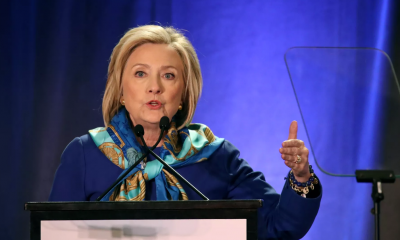World
Third Bush jumps into 2016 White House race

Washington: Jeb Bush, a son and brother of former presidents, joined a crowded field of Republican contenders setting the stage for a possible dynastic clash with a former first lady, Hillary Clinton in 2016 White House race.
Watched by his 90-year-old mother, Barbara Bush, wife of George H W Bush, who lost the 1992 presidential race to Bill Clinton, Bush made the announcement Monday in his adopted hometown of Miami, Florida, a state he governed for eight years.
Formally throwing his hat into the ring after a six month exploratory run, Bush saying that “America deserves better,” declared: “We will take Washington – the static capital of this dynamic country – out of the business of causing problems.”
“The question for me is what am I going to do about it,” said Bush who has cultivated the image of a sober conservative. “And I’ve decided: I’m a candidate for president of the United States of America.”
At one point, he was interrupted by protestors wearing yellow shirts with letters that read, “Legal Status Is Not Enough,” calling for immigration reform.
Departing from his prepared remarks, Bush took a dig at President Barack Obama saying as president, he would pass “meaningful immigration reform” rather than solving the problem via an executive order.
He tried to distinguish himself from other Republican candidates as an executive animated by big ideas and uniquely capable of carrying them out and hit out at Democratic frontrunner Hillary Clinton.
Mocking her “no-suspense primary” he warned that “the presidency should not be passed on from one liberal to the next.”
The 11th Republican contender to jump in the race, John Ellis Bush, 62, the second son of 41st president George H.W. Bush and younger brother of 43rd George W. Bush, who succeeded Bill Clinton in 2001, is banking on more than his family name.
“It’s nobody’s turn. It’s everybody’s test. And it’s wide open, exactly how a contest for president should be,” Bush said hinting he knew he would need more than his lineage to win the Republican nomination,
As a CNN/ORC Poll released earlier this month showed Bush isn’t entering the race as a clear front-runner. It found him virtually tied at the top of the field with Senator Marco Rubio, a fellow Floridian.
Behind them, 10 percent of those polled said they planned to support Wisconsin Governor Scott Walker and former Arkansas Governor Mike Huckabee.
When matched against Hillary Clinton, Bush trails 51 percent to 43 percent.
Bush knows that his family name can be both a blessing and a curse in his White House run.
As the New York Times pointed out “in his speech, he both embraced elements of his heritage and tried to transcend them.”
“That Mr. Bush wanted to keep the focus on his own life, not on his famous family, was reinforced with his spare logo, first used in his failed 1994 race for governor. It reads simply ‘Jeb!'” it noted.
The Washington Post also suggested that Jeb Bush was “running away from his family” name noting his brother and his father were not in attendance for his presidential announcement. “He didn’t even mention them until nearly the end.”
World
Lockdowns in China Force Urban Communities to Defy Censorship and Vent Frustration Online

Shanghai’s rich middle class is leading a wave of online dissent over the strict and prolonged lockdowns imposed in various parts of the country. Chinese internet censorship is struggling as patience is wearing thin in many urban centers, coming up with creative forms of online protests.
Social Media Posts Revealing Lockdown Tension in Shanghai
Drawn-out lockdowns are nothing new in China as authorities insist with the nation’s zero-Covid policy since the start of the pandemic. Currently over This time around, however, metropolitan areas like Shanghai are increasingly difficult to keep quiet, given that its more than 25 million residents have seen weeks of total isolation along with food shortages and many other service interruptions.
Dozens of towns and reportedly over 300 million Chinese citizens have been affected by lockdowns of different severity. As expected, urban netizens have been most outspoken over their difficulties by finding creative ways to get around state censorship and bans placed on topics, news comments and spontaneous campaigns.
Shanghai residents have been using mobile proxies and hijacking seemingly unrelated hashtags to talk about healthcare issues, delivery failures and the overall severity of their situation. The “positive energy” that the Chinese government wants to transmit during the recent prolonged series of lockdowns does not come naturally to those counting food supplies and online censors are working hard to filter words, trending topics and undesired social media sharing.
WeChat groups and message threads are under constant monitoring. Posts questioning the zero-Covid approach have been quickly deleted, including by leading Chinese health experts like Dr. Zhong Nanshan. Video footage is soon censored and protests and investigations are quickly made to disappear.
Where this has not worked, officials have exposed banners with warnings and outright threats like “watch your own mouth or face punishment”, while drones have been patrolling the city skies. Yet, if anything, this has led to further tensions and unspoken confrontation with Shanghai’s educated and affluent middle class.
Creative Online Solutions Harnessing Civic Energy
Announcements by Chinese social media that they would be publishing the IP addresses of users who “spread rumors” have not helped either. Tech industry research has shown that much of Asia’s tech-savvy population has a habit of using mobile proxies and other privacy tools, quickly finding workarounds to browse the internet freely and talk to the world about the hottest topics.
The sheer volume of forbidden posts is already a challenge for the very censorship system, experts explain. Unable to track all trending hashtags, state workers overlook topics that speak about the US, Ukraine or other popular news. Linking human rights elsewhere to their situation, Chinese online dissidents establish their informal channels and “hijack” the conversation to share personal or publicly relevant information about the Covid suppression in their town.
Sarcastic and satirical posts still dominate. Others hope to evade the censors by replacing words from famous poems or the national anthem. One thing is certain – social media, when harnessed with the right creativity, has proven its ability to mount pressure on the government in even some of the most strictly controlled tech environments like China.























